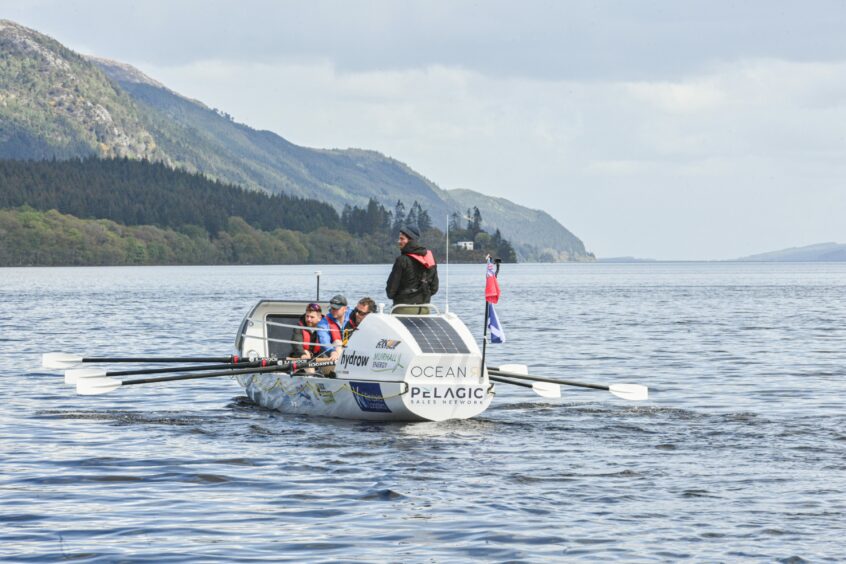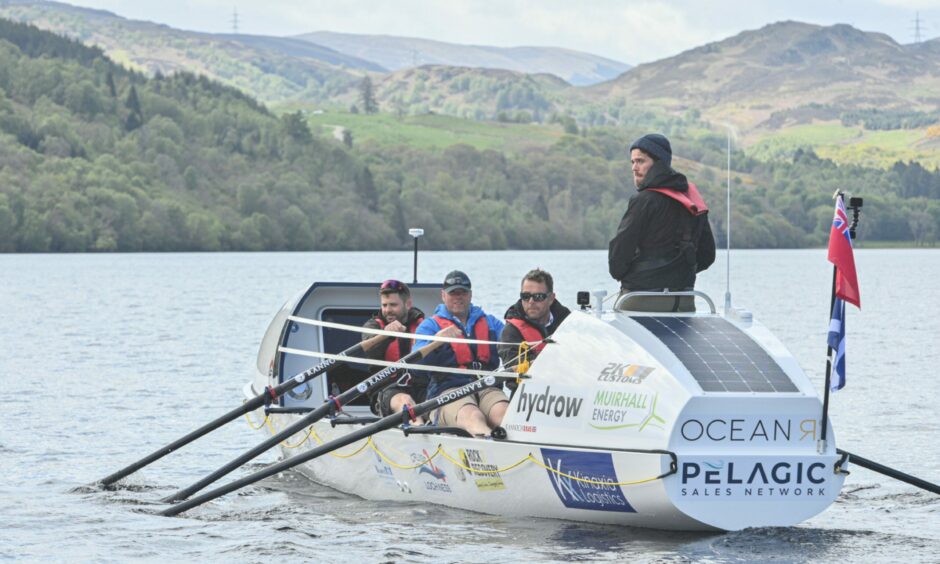A Highland-based rowing team preparing to cross the Atlantic have headed out to Loch Ness for training as the countdown begins.
Team AtlanticR2R took to the water as a four-man team for the first time on Monday to row from Fort Augustus to Dores, covering more than 42 miles in just over 11 hours.
The venture formed the first day of training ahead of the World’s Toughest Row Atlantic challenge.
Around 40 crews from across the world will row from La Gomera to Antigua in December.
Paul Roadnight, a serving soldier with the 3rd Battalion of the Royal Regiment of Scotland; plumber and veteran Tom Atkinson; sailor Jordan Parkinson and his father Richard Parkinson, are aiming to make history by becoming the first Highland rowing team to take on the gruelling feat.
They also want to set a new record for a four-man team – beating the current one of 29 days, 13 hours and 34 minutes.
The group hope their efforts will help raise awareness of mental health and encourage people struggling in silence to seek help and support.
Riding the waves to success
Mr Roadnight said it was “fantastic” to finally be out on the water.
He said: “It was a good day and it felt fantastic to get out and be on the oars. I think everybody was just over the moon.
“Seeing us all row as a team and in sync and learning about the boat, and almost in some ways learning all about stuff that we didn’t even know, it was a cracking day.
“We have got a really good team dynamic. We have got a good bunch; we all get on together and we’ve all got various strengths and people respect each other so that was good to see.
“We all seemed to pull together as a team which was really encouraging.”
The Loch Ness voyage marks the group’s first training exercise in preparation for the 3,000-mile race across the Atlantic.
At noon, the four-strong group took to the water in their state-of-the-art ocean rowing boat to get a feel for the challenge that lies ahead.
Their efforts coincide with the start of Mental Health Awareness Week.
The 41-year-old soldier admits they have a few things to work on, including figuring out the boat’s electronics and crucially, how to stay on top of their nutrition while at sea.
He added: “You need to look after yourself. You can’t neglect your nutrition because you are the boat’s engine.
“One of the biggest things that became apparent to us was we took enough nutrition on the short stint but when we were rowing, you had to stop to eat. Also, drinking is quite a challenge because when you are rowing for three hours, you don’t want to keep stopping because you lose momentum quite quickly.
“Working out how we are going to make sure we eat enough, and we are hydrated enough, is the biggest thing we will need to work on.”
‘You don’t have to soldier on and take it all on yourself’
While working to set a new world record, AtlanticR2R will also be raising money for two mental health charities, Rock2Recovery and Sailors Society.
The cause is very important to the group, having all lost friends, relatives or colleagues to mental health-related trauma.
Mr Roadnight said losing a close friend to suicide was a shock.
“Tom and I having served in the military, had a close friend who was the life and soul of the party, the one person you never thought would be struggling,” he said.
“Outwardly, he didn’t seem to be, but he was struggling somewhere below the surface and unfortunately, he took his own life. He’s one of many – there have been too many – and Tom puts it in quite a good way. He says we’ve lost more people, more friends and colleagues through mental health.
“Jordan and Richard also had experience in their family with somebody who struggled with mental health and them both being from a sailing background, we took on the Sailors Society as another charity to raise money for.”
Speaking on behalf of the group, Mr Roadnight is encouraging anyone struggling with mental health to seek help.
He said: “If there is anybody out there that does have an issue that’s unresolved or their struggling, there are places to go and people to speak to. Reaching out to one of these charities, Rock2Recovery or the Sailors Society could make all the difference to a lot of people.
“I think talking about the issue is possibly the best thing that people can do. You don’t have to soldier on and take it all on yourself. People want to help and if you just speak to people, they can provide you with the support that you need.”




Conversation